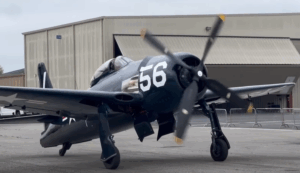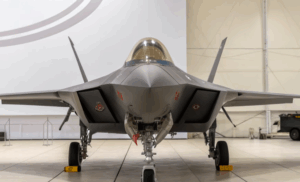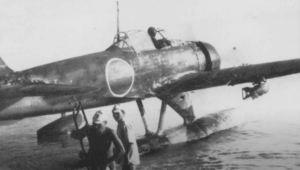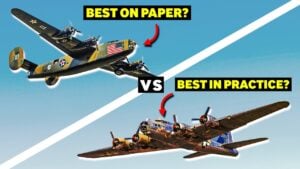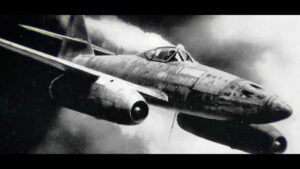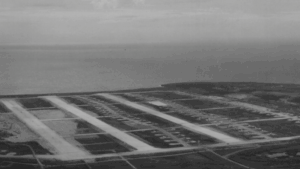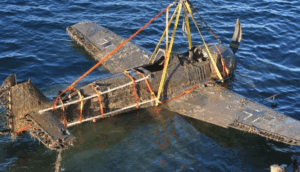The Story of the P-47 Ace Who Saluted and Spared a Crying Japanese Pilot

FlakAlley / YouTube
War is a time when emotions run high, and often, mercy is scarce. However, there are rare moments when soldiers show compassion even amid the horrors of battle. One such moment occurred on December 7, 1944, when Major Bill Dunham, a triple ace pilot of the U.S. Army Air Forces, spared the life of a defenseless Japanese pilot over the Philippine Sea. This story is a rare instance of honor and chivalry in the face of war, and it serves as a reminder that humanity can still exist in even the most brutal of conflicts.
A Clear Sky Over the Philippine Sea
On that fateful day in December, Major Bill Dunham, flying his Republic P-47D Thunderbolt, was leading a patrol of 10 aircraft from the 460th Fighter Squadron. The skies over the Philippine Sea were clear, providing excellent visibility for both American and Japanese pilots. Dunham and his squadron quickly spotted a group of Nakajima Ki-43 fighters, which were unaware of the American planes flying at a much higher altitude.
Dunham positioned his P-47 in a top-down attack approach, a favored tactic for exploiting the Thunderbolt’s powerful armament. As he descended, he opened fire on one of the Japanese fighters, sending it spiraling toward the sea. The Japanese pilot, however, managed to bail out just before his plane crashed into the water.

Remembering a Painful Loss
This could have been a routine engagement for Dunham, who had already earned a reputation as a highly skilled ace pilot. But the events of a few months earlier were still fresh in his mind, and they weighed heavily on him. On March 6, 1944, while flying a patrol off the coast of New Guinea, Dunham and two other pilots—Captain Sam Blair and Colonel Neil Kirby—encountered a formation of Japanese bombers. During the ensuing battle, both Dunham and Blair successfully shot down their targets. However, Colonel Kirby’s P-47 was severely damaged, forcing him to bail out of his stricken aircraft.
As Kirby floated defenselessly in the sky, a Japanese pilot targeted him and opened fire, killing him in his parachute. This act, considered dishonorable by many Allied pilots, left Dunham devastated. The loss of his close friend haunted him, and the incident remained a sore memory as he continued his service. Allied pilots were known for sparing defenseless airmen who were parachuting to safety, as it was expected that they would be captured and placed in prisoner-of-war camps rather than being killed in cold blood.
The Decision to Show Mercy
Now, months later, Dunham found himself in a similar situation. He approached the Japanese pilot who was slowly descending under his parachute. The pilot, likely expecting the same fate as Colonel Kirby, stared back at Dunham, bracing for the end. Dunham lined up his sights, finger on the trigger, ready to fire. Several tense moments passed, but Dunham couldn’t bring himself to shoot. The sight of the helpless pilot hanging from his parachute reminded him too much of Kirby’s tragic death.
Instead of firing, Dunham pulled his plane alongside the descending pilot. The Japanese airman, initially confused and still bracing for the worst, realized he had been spared. The two exchanged a salute—an acknowledgment of mutual respect in a war where such moments were exceedingly rare.

Going Above and Beyond
Dunham didn’t stop there. He knew that the Japanese pilot, now floating in the middle of the sea, stood little chance of survival. The rough waves and lack of any flotation devices would almost certainly lead to the man’s death from drowning or exposure. In an extraordinary act of compassion, Dunham flew his P-47 down to sea level, as close to the water as he could, and tossed a life jacket and food rations to the stranded pilot.
This act of mercy went far beyond what was expected of any combat pilot, especially considering that the Japanese had shown little hesitation in targeting parachuting American airmen. Dunham, who had every reason to seek vengeance after losing his friend, chose to save a life instead.
Escaping the Enemy
Despite this noble gesture, the battle wasn’t over. The remaining Japanese Ki-43s, seeing Dunham’s act of compassion, renewed their attack on his plane. The P-47, though known for its toughness, had lost speed due to the quick turns Dunham had made to assist the Japanese pilot. The attacking planes quickly closed in, and Dunham’s aircraft suffered severe damage, including significant wing damage and the loss of half its tail.
Despite the damage, Dunham’s plane was still able to fly, thanks to its rugged design and the power of its Pratt & Whitney R-2800 engine. Dunham engaged the emergency power setting, pushing his plane to the limit to escape the attackers. The Thunderbolt’s resilience saved him, and he managed to return to base safely, though his aircraft was nearly crippled.

A Legacy of Honor
After the war, Dunham would reflect on the moment he chose to spare the Japanese pilot, telling his wife that it felt as though a higher power had guided his hand, urging him not to fire. Dunham’s actions during the war earned him many accolades, including the Distinguished Service Cross for his gallantry and bravery in combat.
By the end of the war, Dunham had shot down 16 enemy aircraft, making him a triple ace. But perhaps his most remarkable accomplishment was the moment of compassion he showed in the heat of battle. His decision to spare a life, despite the loss of his own friend, was a rare and noble act that stands as a powerful reminder that even in war, humanity can prevail.














